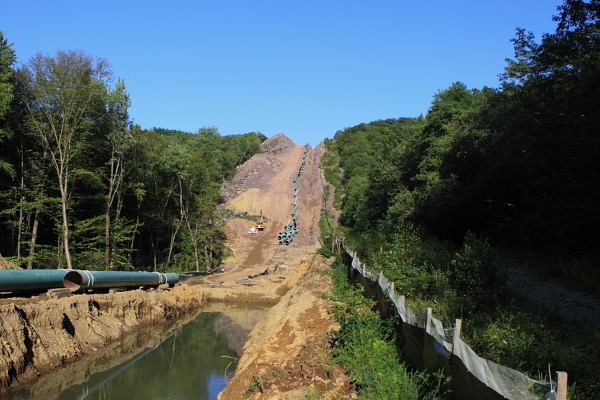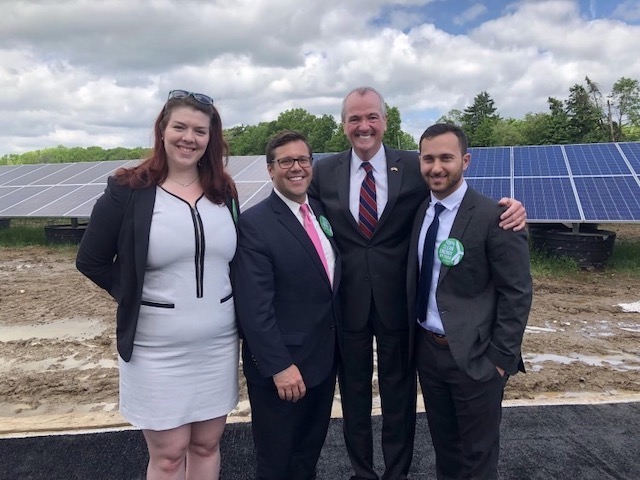FERC Pipeline Approval Exposes The Sham Of NJ Climate Laws And Faux Activists
What’s the Secret “available delegated state authority”?
No immediate end to fossil-fuel use
Department of Environmental Protection Commissioner Shawn LaTourette said he has told advocates pushing to shut down all fossil fuel projects that that is not going to happen anytime soon.
“We need carbon-based fuels to power our economy,’’ LaTourette said. “It is why we don’t see the DEP responding to calls for a fossil fuel moratorium.’’ ~~~ NJ Spotlight
In yesterday’s post, I explained why the NJ Global Warming Response Act (GWRA) is a sham and always was a sham. The goals always were aspirational and unenforceable. (The legal eagles and wonks out there can even see how it was done, see:
That sham has been defended for 15 years by faux climate activists who refuse to fight for implementing legislation to put teeth in the GWRA. Instead of admitting this, they knowingly misled the public and repeatedly praised a series of sham political efforts that they knew would not produce real greenhouse gas emissions reductions or come anywhere near meeting the goals of the GWRA.
I also linked to a prior post that explained, in contrast to the GWRA, exactly how New York State’s climate law had teeth. I again implored NJ climate activists to campaign to demand that such a law be enacted in NJ.
Almost on cue, NJ Spotlight came along and made my point, in spades.
Today, let me quickly translate NJ’s Spotlight’s story about another FERC pipeline approval and the faux opposition of faux climate activists at Rethink Energy NJ (that’s you Tom Gilbert).
The FERC approval and the arguments of Tom Gilbert’s crew expose the sham of the NJ GWRA, because that law does not apply to and can not be used to stop a major expansion of fossil infrastructure that blatantly contradicts the emissions reductions goal of the Act:
The project will lead to a 16% increase in the state’s emissions of greenhouse gas annually, undermining New Jersey’s goal of slashing such pollution by 50% by 2030, according to Ed Potosnak, executive director of the League of Conservation Voters of New Jersey.
See how the criticism is to “NJ’s goal” and what follows is the 50% by 2030 goal set by Gov.Murphy’s Executive Order, and not the goals of the Global Warming Response Act? Once again, this coverage obscures a critical fact. As a result, the public and climate activists are misinformed and the Gov. and Legislature get a pass.
Although environmentalists mislead the public about this too, everyone knows that a Gov.’s Executive Order is only binding on the Executive Branch and does not and can not create law. An EO has no binding legal effect on polluters who emit greenhouse gases and can not authorize DEP to regulate GHG emissions. It’s little more than a press release, yet environmental groups mislead the public into believing that it is real and significant. (just one example of many below)
In addition to misleading the public about the GWRA and the effects of a Gov. Executive Order, for years now, I have criticized these groups for a misguided and demonstrably failed strategy that focuses on FERC instead of: 1) the DEP’s powers under the Clean Water Act Section 401 Water Quality Certification; 2) demands for a moratorium on new fossil infrastructure; and 3) efforts to educate the public and expose the fraud of the GWRA – which does not even apply to these pipeline projects – and work on implementing legislation to put teeth in that law.
Once again, we see that all those issues were neglected and NJ Spotlight’s coverage again ignores them too.
But curiously, the last sentence in today’s Spotlight article cryptically refers to unspecified “delegated state authority”:
The coalition of environmental groups plan to file a motion for a rehearing with FERC and are asking the Murphy administration and its Pennsylvania counterparts to do the same. They want both states to use available delegated state authority to deny the project.
What “delegated state authority” might that be? Is it a secret? Talk about burying the lede! In a vague allusion in the last sentence! They can’t even name the authority, lest it expose their sham and vindicate my criticism.
Could it be the Clean Water Act Section 401 Water Quality Certification authority I’ve been criticized them for years for failing to focus on and criticizing NJ Spotlight for failure to cover?
In conclusion, let me again summarize why a focus on FERC is a fools errand and a total waste of time, money, and activists’ efforts, while diverting attention from far more effective strategies and tools:
1. The federal Natural Gas Act was written by the fossil energy companies to promote and expand fossil energy. It is not an environmental law and gives short shrift to environmental considerations.
2. The FERC is captured by fossil energy industry and routinely rubber stamps virtually all pipeline projects seeking their approval.
3. But even if the Natural Gas Act was balanced and considered environmental concerns and even if FERC were a neutral agency devoted to the public interest, the arguments made by NJ Rethink would still be absurd and fail. Here’s why and it doesn’t take a lawyer to understand these obvious arguments:
First, the NGA and FERC are designed and authorized by Congress to consider and advance the NATIONAL interest.
Second, there is also a Constitutional doctrine known as the Commerce Clause that prohibits unreasonable State restrictions on inter-state commerce. This national market based perspective and discouragement of State barriers doctrine influenced the NGA and FERC.
Third, Rethink and the NJ offer up narrow State based economic arguments that focus on the exclusive economic interests of NJ. Their arguments based on need and the energy demand and natural gas capacity are limited to NJ (instead of the region and other states that would be served by the pipeline).
By definition, those NJ based arguments have zero weight before FERC.
Both Rethink NJ and the NJ State government opponents are not serious, because they surely know that the arguments they offer are absurd and violate FERC law and policy.
They only pretend to oppose the pipeline and do so for self interested political reasons. They can tell the public that they’re trying. Arguments opposing the pipeline before FERC by State officials create a false appearance that the Murphy administration is opposing fossil infrastructure and fighting for climate goals, when exactly the opposite is true. (see above quote by DEP Commissioner LaTourette).
Environmental groups can fundraise. They can pay their friends the legal and economic consultants and feel important in “managing” them. They can hold press conferences and meet with the Governor and DEP Commissioner. They can use all this activity as “metrics” in their grant reports to their Foundation funders. They can praise their “grassroots activist” supporters and get emotional support and donations from them. They can protect their backyards and their pastoral private preserved lands. But they are not really trying. They know their arguments to FERC will fail. They are posing and virtue signaling. You can tell this is true because they refuse to make serious arguments and fight for efforts that have won in other states, like New York.
Yet this incompetence is well funded and reported by news media as serious advocacy, while real solutions, used by our neighbor in New York, are completely ignored.
[End Note: We have been vindicated by history –
In an October 7, 2007 Sunday Star Ledger Op-Ed, we warned everyone and explained why the law was designed to fail (for full text, see: No teeth in ‘tough’ pollution law):
The law — contrary to widespread media coverage — does not legally cap greenhouse gas emissions or mandate emissions reductions on any major pollution sources. As a result, the law’s theoretically “mandatory” goals are unenforceable and therefore a fiction. They amount to the same voluntary approach backed by the Bush administration.
Specifically, the law provides no regulatory authority, funding or staff for the DEP to take the necessary steps to implement and enforce the emission reduction goals. Instead, the DEP is kept on a tight leash and merely directed to develop a set of recommendations on how to meet the goals and to submit that proposed plan to the Legislature by June 2008. In passing the law, the Legislature merely kicked the can down the road, postponing hard choices for well over a year.
Perhaps even worse, any DEP powers to implement the goals of the law were explicitly narrowed. DEP’s role is limited to emissions monitoring and reporting progress in achieving the goals.

